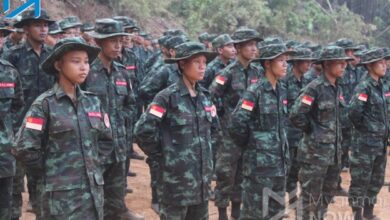
The Pa-O National Organisation party (PNO) has ended its alliance with the military-backed USDP ahead of this year’s election on the grounds that Pa-O people disapprove of the pact.
In the previous two general elections, the PNO stepped aside in 10 constituencies in Shan state to clear the USDP candidate’s path to victory.
“In the 2010 and 2015 elections, we agreed that if both parties ran in the same constituencies, we weren’t sure we could win,” said Khun Thein Phay, secretary of the PNO.
The one-sided agreement, in which the USDP did not step aside anywhere for the PNO, appears to have rankled voters.
“We’re terminating the alliance because the Pa-O public doesn’t want it. If we have ties with them, the public won’t accept it anymore,” Khun Thein Phay added.
In 2010 and 2015, the PNO won in all three townships in the Pa-O Self-Administered Zone, while the PNO won in Mawkmai, Lwai Lal, Namhsan, and Lawksawk, all areas where many Pa-O people live.
The USDP won the most in the seats in the 2010 elections, but that poll was widely regarded as rigged. In 2015 the party won fewer than 10% of the total elected seats, while the National league for Democracy enjoyed a historic landslide.
Shan state, where the NLD wields less influence than it does in central Myanmar, is arguably the most important region for the USDP.
Eighteen of the 41 national seats it won in 2015 were in Shan state. In the State and Regional Hluttaws, the USDP won 74 seats including 31 in Shan state.
Shan state’s Hluttaw has a total of 102 elected representatives, making the USDP the leading party with over a third of seats. Both the state Speaker and Deputy Speaker are USDP politicians.
The PNO said on Sunday that the party planned to run in 35 constituencies in Shan, Mon, Karen, Kayah and Bago, all of which have sizeable populations of Pa-O people.
It will also contest 10 constituencies in the townships of Hopong, Hsi Hseng and Pinlaung, inside the self-administered zone.
Khun Thein Phay said he thought the PNO would likely hurt the USDP’s chances in these areas.
“In these constituencies, we’ll become the USDP’s opposition. We gave them all our votes in both the 2010 and 2015 elections,” he said.
Sai Lon Kyaw, a USDP politician and the Shan state minister of agriculture, livestock and irrigation, said the end of the alliance with the PNO would not affect the number of representatives the party returned to parliament.
“We co-operated before. But now they’re on their own and we’ll be the same. We’ll see the result after the election,” he said.
Khun Thay Phay said the PNO “should be winning” constituencies outside of the self-administered zone with Pa-O voters.
The PNO was formed as the political wing of the now-disbanded Pa-O National Army, whose 1991 ceasefire with the then military government paved the way for the formation of the Pa-O Self-Administered Zone.


![Resistance fighters holding heavy weapons ammunition in central Myanmar. (Photo: Freedom Revolution Force [FRF])](https://myanmar-now.org/en/wp-content/uploads/sites/5/2024/04/438869056_443267851680128_1706386881626943924_n-390x220.jpeg)
